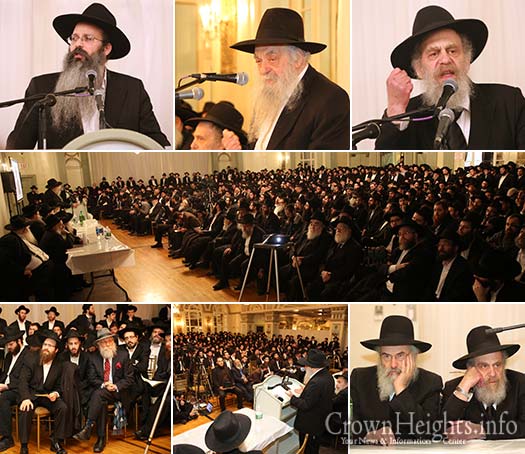
Thousands Gather to Address Community’s Proper Path
Over 2,000 members of the Crown Heights Lubavitch community gathered at the Oholei Torah ballroom last night, Nittel Nacht, for an ‘urgent Kinus’ called by Rabbonim, Roshei Yeshiva and Mashpi’im regarding recent troubling developments in the community.
Despite the fact that it wasn’t once mentioned by name, the Kinus was called in response to the recent revelations that several educators and students in the community have been attending seminars by the ‘Call of the Shofar’ program, which many community leaders have identified as a cult.
The overwhelming theme of the event was that all members of the community must look out for one another. “If you see a friend who is in need, give him a helping hand. If he is sick, take him to the doctor. If he lacks mental health, take him to a psychiatrist,” declared Rabbi Yoel Kahan, Mashpia in central Tomchei Temimim, “but you will not find Kedusha in Meshugas.”
The event was attended by virtually every Rov, educator, Mashpia and lay leader in the community. Notably present was Rabbi Yosef Heller, who hadn’t sat at the head table of a community gathering for 22 years.
In a groundbreaking first, CrownHeights.info broadcast the event live through our YouTube channel. Almost 5,000 people tuned in to watch the event in real time. Due to the popularity of the broadcast, we hope to stream live video from many such community events in the future, which will greatly benefit our readers who are unable to attend in person.
A full recording of the speeches is being uploaded and will be available here shortly.
Reb Yoel Kahan – 1st Speech
Reb Yoel Kahan – 2nd Speech
Rabbi Ezra Shochet’s Speech
Rabbi Aron Ginsberg’s Speech





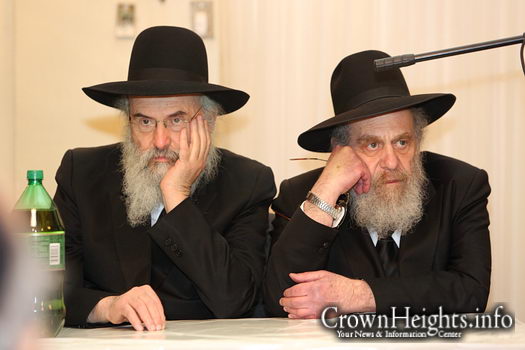
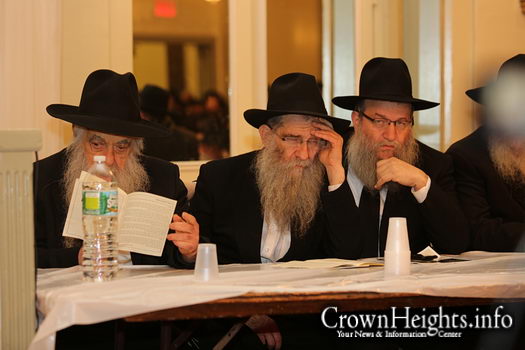
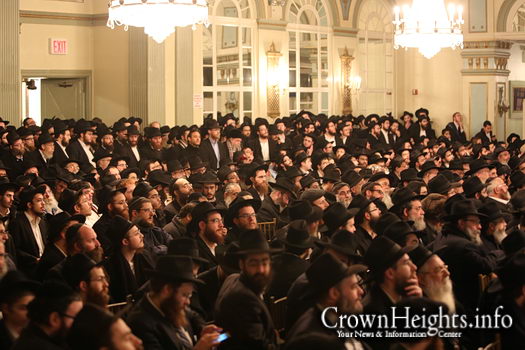
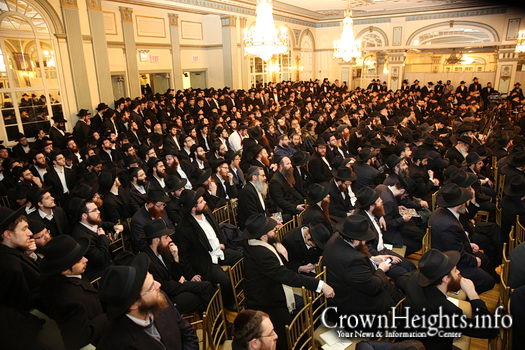

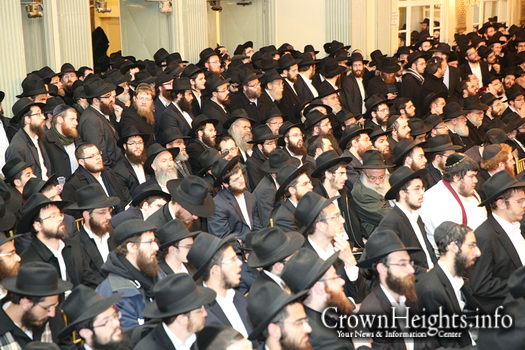
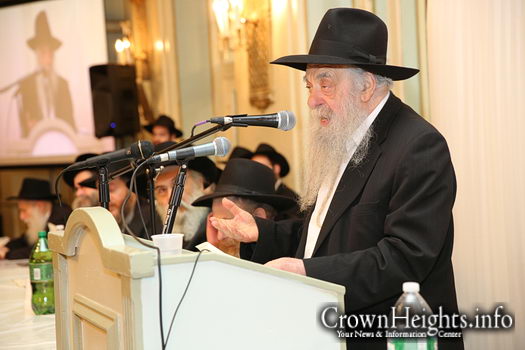








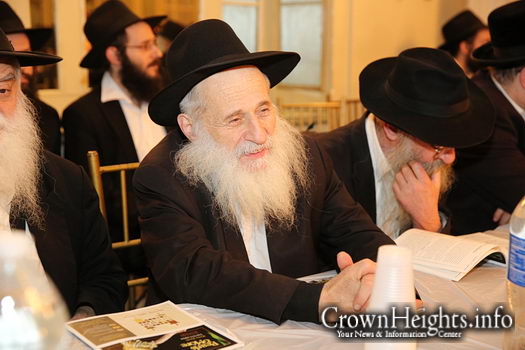




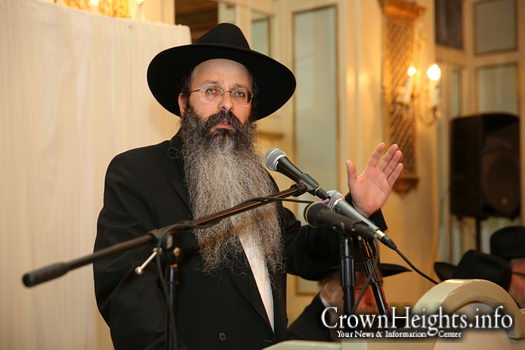








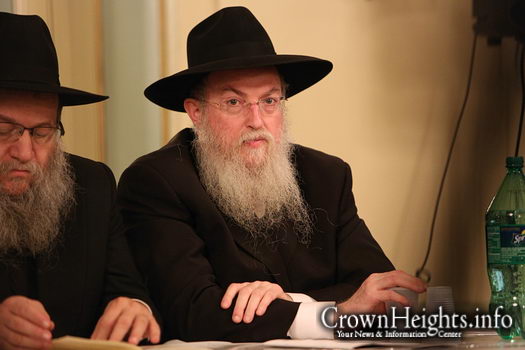


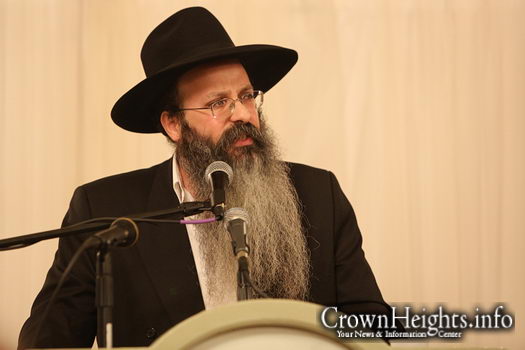






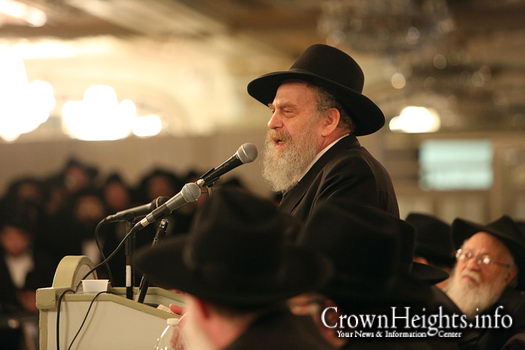





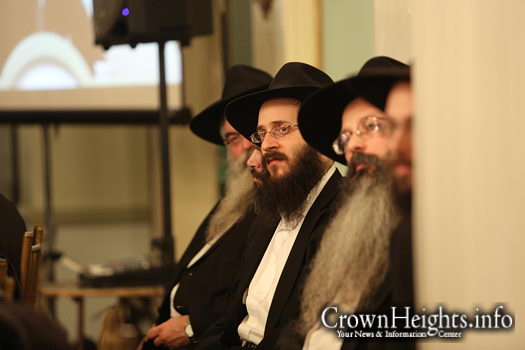

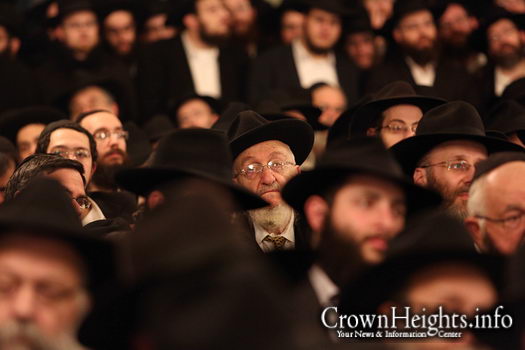

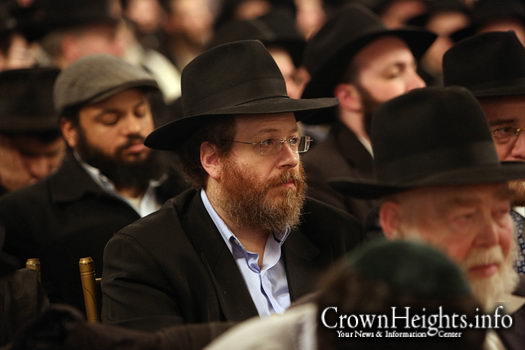
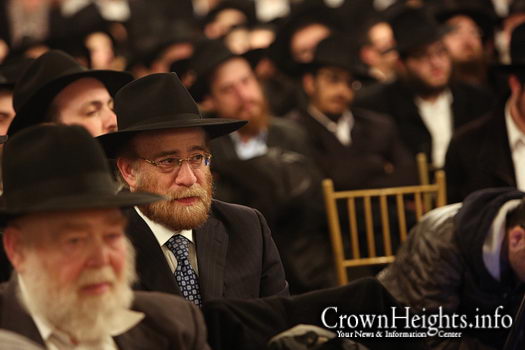


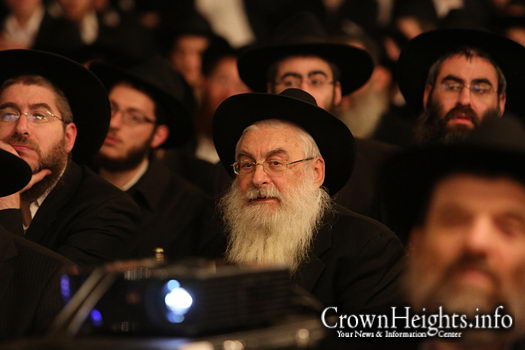

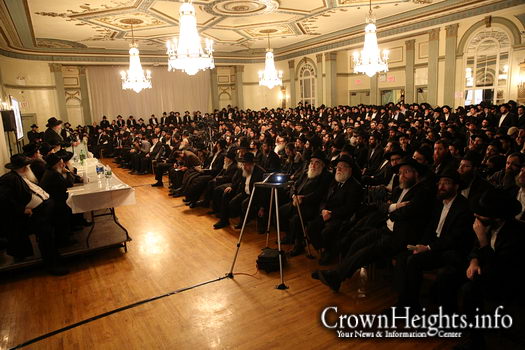
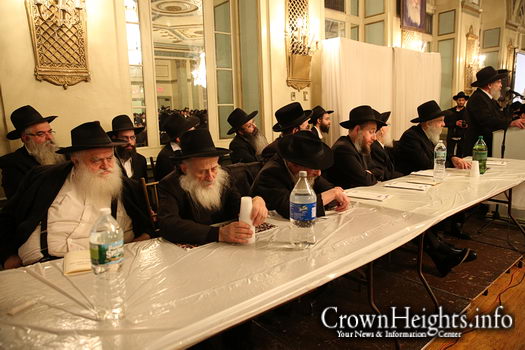
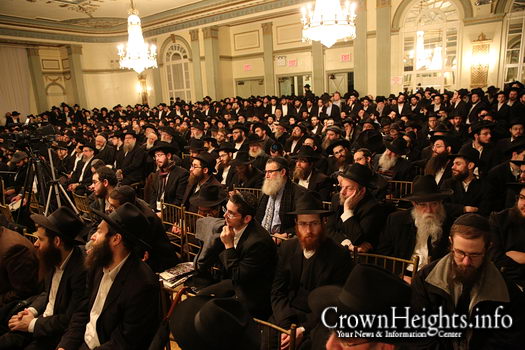
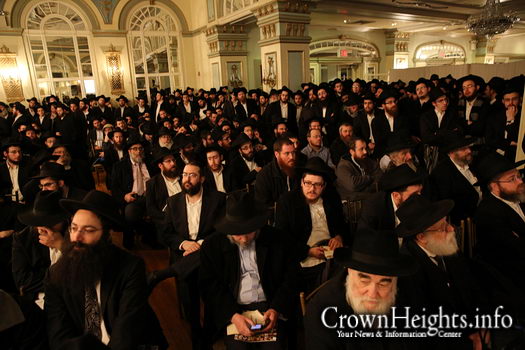
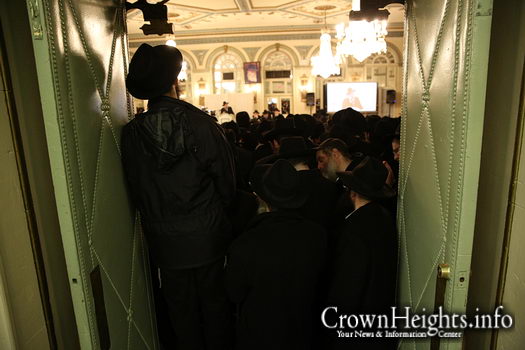
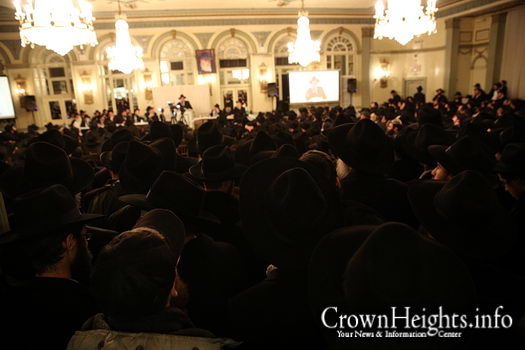
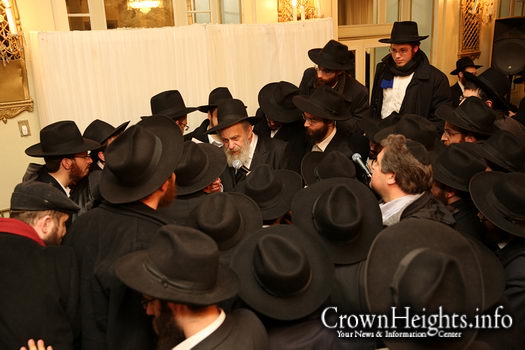
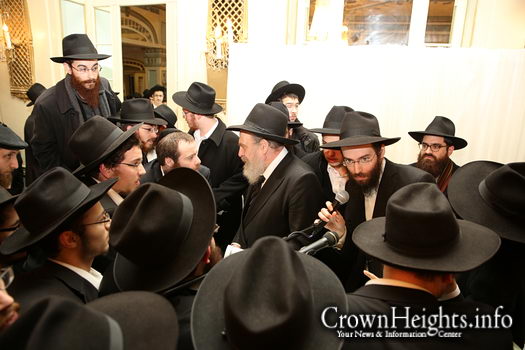
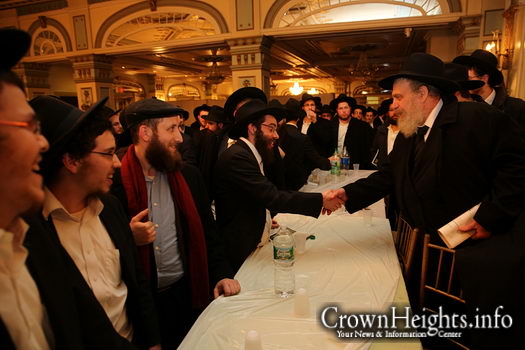

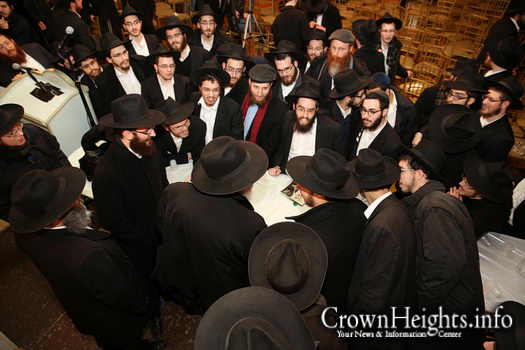
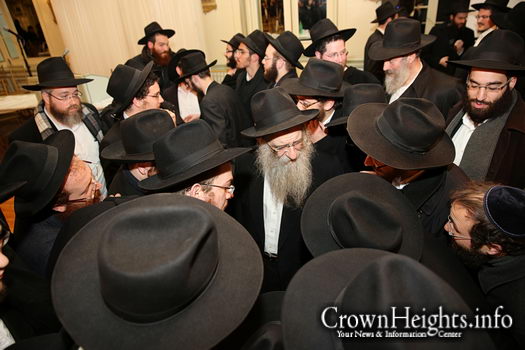
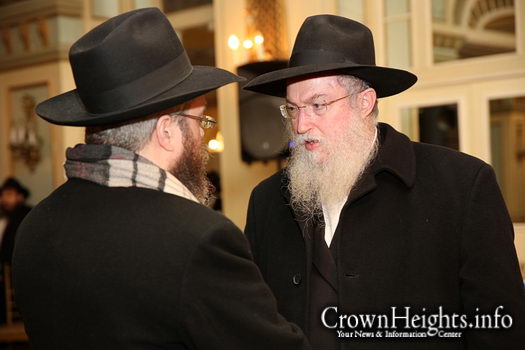












yanki
Wow. Thanks ch.info. Agav your broadcast was the with the least hangups, and once the sound was working was the best quality too.
This was a great productive event for nittel nacht.
concerned Crown Heights mother and Morah in
This is so amazing and wonderful that this event happened. However I also have concerns that I would have liked to raise as a mother and Morah in this community. Unless the women were behind a mechitza, I don’t think any were present. I would like to at least be notified about something like this. Even if it’s just so I can give you the issues that need to be addressed, or my ideas as how to solve them. Thank you in advance for, next time, being a mensch and at least include the Rebbitzins by proxy!
Citizen Berel
Rebbitzins are involved by proxy.
This was R’ Yoel and R’ Shochat speaking and there were no concerns raised by anyone.
This is a strange comment.
young
90% of attendees are older people
100% of attendees would not go to shofar
100% of people who need and/or go to shofar were not there
waist of time
wrong message and wrong messenger
Chaim
Not true!!!
I did not go to Shofer but I know of some that went (after the fact) and I did see a few there.
I also saw parents of those that went.
WHY
What are the yeshivoth doing about the fact that cult members are handling Jewish kids ???
are thy sent to deprogram or continue in the way of cult and avodah zara ???
That's it!
This all lead me to enroll in COTS
CHLEAKS.COM
Is this some sort of threat?
Pinni Lew
call me to enroll
and come with the money
Watched on you tube
looks like all the people who don’t need to be there are there and all the people who do are not, i p[personally watched via you tube , enjoyed Reb Yoel i would encourage to post subtitles of his speech not always easy to understand him, but if you do hes 100% real will not find the same truth anywhere else
Interesting
What did R’ Nachman Schapiro say? I heard that he is one of those encouraging people to go.
Pay
I promise you if pay the rabbi $650.00
you get help.
that’s not fair to pay for avoda zara and not for rabbi
Yeshiva
Yeshiva in Morristown was a Cult. If you didnt say Yechi, Mashpia and bochurim held you under suspicion. Nowadays, Yechi is banned completely.
Its a different cult today.
Control, control, control, control. Its just others controlling what you say, what you don’t say.
We really have our own cult to worry about.
Berl
I know the solution!
We have to have more such Farbrengens – with R’ Yoel speaking and inspiring.
THIS is the problem! We have to hear (again) the real stuff – then we won’t have to run to other places for satisfaction.
I am serious not joking.
#2 Yes women were present
They were in a separate part of the room with mechitza.
concerned Crown Heights mother and Morah in
Thank you so much for clarifying #14. I think there are MUCH bigger issues to worry about than this. I wish the Rabbis would get more involved in what’s going on with the complete lack of affordable housing for poor families in our communities! Landlords discriminate left and right, leaving larger families and single mothers with literally no place to live. Maybe Crown Heights should put a sign at borders that says, “poor families not welcome here, please go live somewhere else.” Can I only live in Crown Heights if I can afford an expensive car, and $3000/month rent apartment? Which one landlord said was his “investment,” so he absolutely could not do “rent to own” with us. The blood, sweat and tears of another Jew working hard to pay your mortgage is your “investment”??? Wow. We’ve sunk to an all time low, Crown Heights, and we must do Teshuva. I’m glad we are all so religious that we boil our sugar on Pesach, but when poor people are oppressed like they are in Crown Heights, Hashem is NOT happy with us. That’s great that you are concerned about some group that may be a cult, but that is small potatoes compared to the real issues that people are facing every day in Crown Heights. Thank you for respecting my opinion, even though it may be different from yours.
grow up
your opinion is that of a two year old. nobody owes you anything, many of these landlords have a lower income than you do and they need to pay the bills all the same. and don’t whine in this forum, you look stupid
Reb Yoel's speech.
Reb Yoel’s speech was a masterpiece! I highly recommend listening to it on the computer – even if you were at the event.
Very powerful words!
Reb Yoel's speech
Rabbi Yoel Kahn: Chassidus is the Only Path to Spiritual Fulfillment and Happiness
Prepared by R’ Eli Rubin
In a speech delivered on the evening of Tuesday, Tevet 21st 5774, Rabbi Yoel Kahn spoke out against the perception that people might be able to more easily find spiritual fulfillment through sources other than Chassidus. Drawing a sharp distinction between the worldly approach to happiness and the Chassidic approach to happiness, Rabbi Kahn argued that we have to realize that at its heart Chassidus carries a very practical message. G-d has given us the privilege of an unbreakable connection with Him, and it is only by embracing that relationship and subjugating ourselves to G-d’s will that we can reach ultimate fulfillment and happiness. The full transcript of Rabbi Kahn’s speech follows below.
* * *
Lately we have been hearing that people are searching. They are not sufficiently happy, so they are searching. To search is actually a very good thing. But we have to know what we are searching for and where to search for it. There is a distinction between the way many concepts are perceived by the general world and the way they are understood from the perspective of Chassidus. The same applies here.
When a person is lacking some kind of vitality, is not internally happy, what can be done that he should become happy? From the worldly perspective, the answer is that he should become free; that he should have no yoke upon him. So long as he has a yoke he is limited thereby; it constrains him.
It is noteworthy to contrast this with the way Chassidus looks at it. There is a letter penned by the Rebbe on the 17th of Elul 5710 (1950); a Jew had complained about various things, concluding that he “cannot find satisfaction,” and that “he feels that he is missing something.” This is what the Rebbe wrote in reply: “In my opinion, what he is missing is acceptance of the yoke (kabbalat ol).” This is exactly the opposite of the worldly outlook. What is the meaning of this?
* * *
Let’s take it even further. There is discourse from the Rebbe (Rani Ve’simchi Bas Tzion, Sivan 27th 5727, printed in Sefer Maamarim Melukut Vol. 4), where he explains why G-d “turned the mountain above their heads like a barrel” before giving the Jewish people the Torah. G-d forced them to accept the Torah. Everyone asks the obvious question; the Jewish people wanted to accept the Torah of their own volition, they had already said “we will do and we will listen.” Why then did G-d have to force them? The Rebbe explains this at length; his explanation is founded upon a teaching of the Baal Shem Tov and the Rebbe explains it with great depth. But simply speaking, when the time comes that a Jew does not want to accept the yoke of mitzvot, this is when the power of the overturned mountain has its effect; something compels him and forces him so that even when he no longer wants it, he cannot tear himself away.
Accordingly, there can be three general ways in which a Jew learns Torah and fulfills mitzvot: One way is that he enjoys it, he is a religious Jew, a Chassidic Jew, and he enjoys it. He learns a piece of Gemara and enjoys it, he does a mitzva and enjoys it, and so on. That is one way. A second Jew has no particular desire, he doesn’t enjoy it, but accepts the yoke of heaven. He knows he has a yoke upon him and he does want to be a pious Jew. He does accept the yoke, but it remains a yoke, a burden from which he doesn’t derive any pleasure. The only motivation is his acceptance of the yoke of heaven. A third person, doesn’t even want to accept the yoke of heaven. He wants to abandon it, but there is something that prevents him from doing so. What is that prevents him? That turning over of the mountain. G-d transmitted something of such potency that the individual cannot tear himself away. Practically speaking, this is expressed in different ways, either because of something his father has said, or that his grandfather said, or that his childhood teacher said. But this is only the technical medium. What is it really? It is the effect of G-d turning the mountain above their heads like a barrel.
Now, let’s think about these three types of Jews; one enjoys Torah and mitzvot, another has no enjoyment but accepts the yoke, the third doesn’t even accept the yoke, but cannot bring himself to abandon it, something prevents him. When is happiness possible? How can one’s study of Torah and fulfillment of mitzvot be permeated with happiness? For the first person it is understood, he has an outright pleasure from learning, whether from studying a page of Gemara or from learning a chassidic discourse. Likewise he enjoys fulfilling mitzvot, he fulfills mitzvot in the most beautiful way, and with enthusiasm. The second person only accepts the yoke; seemingly there is no enjoyment here.
But Torah tells that it is not so. In the Beit Hamikdash there was the pouring of the wine and the pouring of water (nisuch ha’yayin and nisuch ha’mayim); wine has an enjoyable taste, water does not. Similarly, when a person understands what he is doing he enjoys it, but water has no taste and is likened to a person who simply accepts the yoke. But the Gemara says that true joy was experienced when the water was poured, “one who did not see the happiness… never saw happiness in his life.” Elsewhere wine too is described as causing happiness, but in comparison to the happiness of water this is not happiness. True happiness was experienced specifically when the water was poured. This is very strange; when a person knows and understands we say that he doesn’t achieve true happiness, but by simply accepting the yoke he finds happiness.
When we come to the third type this goes even further. Here the individual doesn’t even accept the yoke; is happiness possible even for this person? The Rebbe says yes. A very strange thing. When a Jew says “you have chosen us from all the nations,” that G-d has forged such a relationship with us that even if we want to abandon Him we cannot, this is the greatest possible joy. Such a deep relationship! Such a deep connection that he cannot tear himself away even if he wants to. This joy, which derives from the recognition that he is so strongly connected that he can’t tear himself away, is even greater than the happiness that is derived from simple acceptance of the yoke. He rejoices that he is so strongly bound with G-d.
This expresses a different vision of how a person achieves happiness. The way it is seen from a worldly perspective compared to the way it is seen from a Torah perspective is an entirely different world.
* * *
Let’s return to what the Rebbe wrote in that letter. The individual complained that he is dissatisfied, that he feels he is missing something. The first thing the Rebbe writes in reply is that “what he is missing is acceptance of the yoke,” and that “this is the foundation and root of all service.” Then the Rebbe continues to explain how one brings oneself to accept the yoke, that this is simple, that one doesn’t need to achieve lofty levels; simply, as it says in Tanya, to contemplate how G-d “views and looks and searches the interior of each individual…” Then the Rebbe continues further, “In order to make this work easier for him, G-d gave him the merit that he is a chassid, which means that his soul is a part of the general soul of the tzaddik, and if the individual soul is missing something, through the correct connection he can draw whatever he is lacking from the general soul…” The Rebbe continues to write at length, discussing many foundational ideas, that a mitzvah is a means to connect to G-d, etc.
But there are situations when a person is unhappy, when he does indeed need to see a medical professional. To make it into some kind of movement requiring everyone to seek medical help, is obviously a very strange idea. It doesn’t stand up, neither according to Torah, nor according to human reason. But it is clearly understood that someone who is ailing must go to a medical professional. Even if in such a situation, in which one does need help, one has to know which doctor to go to and on what kind of basis; there are many things that need to be considered. Furthermore, even in such a situation, no doctor, not even a good doctor, can make a person happy. If an individual is missing something, no other person has the ability to replace that which is missing. Certainly, as the Rebbe writes in the letter, G-d sustains everyone and will fill everything with good. But when a person is missing something, the question is what is the address? What is the address to which you should turn for fulfillment? There is no reason to start looking elsewhere. The address is right here.
* * *
Sometimes we try to convince ourselves that “G-d’s glory is upon the heavens.” We want to exalt G-d, saying that he transcends even the heavens, but does he also have a connection with simple people? Is he present down on this earth? Chassidus, we argue, is a very lofty discipline. Certainly, we must learn Chassidus, but we study it as another subject. “I am just a simple person, with a coarse animal soul; I am not especially refined. So what connection does it have to me?” This is a mistake. This is where the dog lies buried. We argue that everything taught in Chassidus is not sufficiently tangible. Of course there are lofty ideas, but the ideas expressed in the Rebbe’s letter are very simple.
A Jew must simply reflect on the fact that we have a Rebbe, that the events of Gimmul Tammuz did not change anything, and the Rebbe gives us attention just he did previously. This is a fact, and it is meant in the most simple sense. This is not something that we’re just saying to comfort ourselves. This is the fact. What it says in Tanya, that tzaddikim are more present following their passing than they were in their lifetimes, is a fact. This refers to tzadikim in general, and especially when we are discussing a shepherd of Israel, “shepherds of Israel do not abandon the sheep of their flock.” The Rebbe used that phrase regarding the Rebbe Rashab. But in this case it is even more intense; the Rebbe Rashab left behind a son, and the Friediker Rebbe left behind a son-in-law, but in our situation we only have the Rebbe just as it was before.
If somebody is searching, if somebody is in such a situation that he needs to pour out his heart to somebody; where can he pour out his heart? where can he cry his heart out? Apart from the fact that he can go to the Ohel and ask for a blessing, which is a whole different concept; we are talking about the need to express what is in one’s heart. The only Jew — not a Jew in the supernal realms, but in this world, “found in all realms more than in his lifetime” — to whom he can cry out to and speak his heart to is the Rebbe. Talking from a psychological perspective, there is a need to pour out what is in one’s heart, but not everything can be said to just anyone, some things can only be said to a very strong and close friend. This is a very practical thing. When we exalt these notions, arguing that this is a heavenly thing or some kind of spiritual thing, we are making a big mistake.
* * *
Another thing mentioned in this letter, is the special opportunity that this individual has as a Shliach of the Rebbe. We are all Shluchim of the Rebbe. There are those who are specially designated as Shluchim, but we are all Shluchim. In the very first discourse that the Rebbe said in 1951 he stated that we are now in the seventh generation and that the purpose of the seventh generation is to draw down the essence of the divine presence. It is for this that all the generations have waited, it is for this that the Torah was given, for this the mishkan and Beit Hamikdash were built, for this Chassidus was revealed, for this Chabad Chassidus was revealed. All of this for what? For the individuals of this generation.
Somebody said to me that the reason one might go to one place or another is because there they uplift the individual. Nothing uplifts an individual like Chassidus. Accepting the yoke of heaven doesn’t mean that you are a nothing. On the contrary! Chassidus tells a person how great he is, that G-d has given you unparalleled ability and an unparalleled responsibility. This is all clear. But to achieve happiness you need to have the right perspective. As the Rebbe writes again at the end of this letter, “abandon the excessive complaints… subject your will to the will of our Rebbe who has transmitted to you the will of G-d…” The emphasis here is again subjugation of the self and acceptance of the yoke of heaven. Why does the Rebbe continually emphasize subjugation? A person complains that he cannot find satisfaction and the Rebbe’s answer in subjugation!
But that is exactly the point. When Jew says “you have chosen us from all the nations,” when he praises G-d that he is so strongly bound up with Him that even if he wants to he cannot tear himself away, he is not complaining. He doesn’t pity himself saying, “Woe! What should I do that G-d has chosen me…” A Jew say “you have chosen us” with happiness and with a melody. On the contrary! Despondence is the very opposite of this chosenness. It is imperative that we not see this as some kind of heavenly or abstract idea. We should not say “G-d is exalted above all nations, his glory is upon the heavens.” This is the fact, the practical reality.
* * *
There is a humorous anecdote told in the name of Reb Itche der Masmid, that there was once a nobleman’s estate and he had dogs, very big dogs, so that it was impossible to pass through there. If you has to pass through you would travel with a very high wagon, which was too high for the dogs to jump up on. Two Jews were passing through one on such a wagon and one by foot. The one with the wagon told the other to join him on the wagon to protect himself from the dogs. But he said “No, I’m not afraid.”
“Why are you not afraid?”
“I have an incantation, and as soon as I repeat this incantation the dogs will disappear.”
The Jew on the wagon wasn’t so impressed by this, so he drove very slowly so that if anything happened the other Jew would be able to climb aboard. Soon enough, the Jew on foot shouted for help and jumped on the wagon. Afterwards the wagon driver asked him what happened to his incantation.
“My incantation?” he said, “My incantation is a sure thing. There’s nothing to talk about! But the dogs didn’t even give me a chance to say it.”
Chassidus is a conducive remedy for everything, but sometimes the dog doesn’t let you use the incantation. Sometimes the dog says that the books should remain on the shelf, that we shouldn’t learn them; but sometimes the argument is more subtle. “On the contrary, learn it, but in practice it is not effective. It’s a spiritual thing, but you are a coarse person. You, you need to search elsewhere; search for things that are lower and more tangible.
* * *
From here we need to go forth, as was said earlier, to strengthen one another. First of all, the more Shiurim established, the better, in the very simplest sense. Likewise, the more Chassidic Farbrengens, the better. And at a Chassidic Farbrengen we must talk to the point. Not to speak nonsense or about irrelevant matters, but to explain that Chassidus is practically effective and relevant. That all things were for the purpose of this generation, that G-d chose us and gave us the greatest abilities, and that from this we should derive happiness. We must work, certainly we must work. Don’t search elsewhere for any nonsense or for any wisdom. Neither nonsense, nor wisdom. We should walk in the Rebbe’s ways for ever and for eternity.
Addendum
I believe that everyone clearly understood what was said. But sometimes we must spell everything out clearly, so that there will be absolutely no mistakes. Earlier we spoke, and Rabbi Schochet spoke, and he probably elaborated more than me, but I see that we still need to spell it out even clearer.
Earlier we explained that there are two perspectives on how to look at a person who feels dissatisfied, and two way to look at the way forward. There is a worldly perspective, and a Torah perspective — a Chassidic perspective. The worldly way is to decrease the yoke as much as possible; one wants to become free. They tell you you’re a great person, don’t worry about others, be yourself. But what does this come to? What is the measure of this person’s self? It can be nothing more than what it is. But the less yoke, they claim, the more the self is helped.
But then, as I mentioned earlier, there is a different perspective. There was a Jew who complained that he did not have satisfaction, and the first thing the Rebbe says is accept the yoke. That’s the first thing. But then this goes even further, there is the concept of G-d turning the mountain over them, that even when one no longer wants it, the relationship with G-d cannot be broken. And it is from this relationship that true happiness is derived.
The Rebbe once said something, not exactly about this, but nevertheless a relevant statement, “For a Jew, true being is non-being.” This is the difference; for a regular person his being is nothing more than his being, therefore if you subdue him and place a yoke on him it is a negative imposition on his sense of self; it constrains him. But for a Jew exactly the opposite is true; his being is his relationship with G-d, expressed through subjugation to G-d’s will.
Who communicates this and reveals it? Torah and Judaism in general, and especially the teachings of Chassidus. This is the notion behind “we will do and we will listen” and even more so “he turned the mountain over them like a barrel.” Accordingly, when does a Jew achieve true happiness? The more that he is touch with his Divine soul. And what is the Divine soul? Acceptance of the yoke of heaven. Moreover, a Jew says “you have chosen us” not with self pity, but on the contrary, with joy!
In the discourse that we mentioned earlier, Rani Ve’simchi, the Rebbe asks how we can achieve happiness even when the relationship is only because G-d turned the mountain over them? The Rebbe answers that this is through our relationship with the Rabbeim, our relationship with the Rebbe.
* * *
This has all been clearly elaborated, but it means as follows: Since people are searching, and searching itself is a very desirable thing, we must know where to go, where to look and where to find it. In simple language; we have no reason to enter foreign gardens. If somebody did enter foreign gardens, what has passed has passed, it shouldn’t be repeated.
What are the resolutions of this meeting? The first resolution is that this matter is entirely out of the question. This is clear. There are no foreign gardens, we have a garden, we have our own garden. What is our garden? This brings us to the second resolution; one is dependent upon the other. We have to increase our study of Chassidus as much as possible, the study of the Rebbe’s discourses as much as possible, the Rebbe’s talks and the Rebbe’s letters. We need to learn these and realize that it does not consist of heavenly abstractions, these are effective in our tangible reality.
There are tens of letters of the Rebbe, if not hundreds, where Jews asked how to find tranquility in their souls, and the Rebbe answered that there is only one way — one must conduct oneself in accordance with the directives of Torah. That’s it. Conducting oneself in accordance with the directives of Torah is the path to a tranquil soul. This applies especially to Chassidim. But the evil inclination clamours in your head and tries to confuse you, and presents a clever argument that “on the contrary, Chassidus is a very lofty discipline.”
We have to know that this is the seventh generation, and that each one of us has the greatest abilities, and that the Rebbe empowered us, and continues to empower us. And that if someone wants to pour out his heart, he has where to pour his heart out. The Rebbe listens just as he did previously. And when someone comes and pours out his heart and requests a blessing the Rebbe prays on his behalf, and the Rebbe feel his pain. And when the blessing is fulfilled and the individual returns to inform him, the Rebbe is pleased. We have no reason to go who knows where. If you want to speak out your heart you have who to speak to, and you have who to ask for a blessing too. If you are searching for a path in life, this is the path of life that the Rebbe gave us. We must continue to follow with even greater strength. We will walk in the Rebbe’s ways for ever and for eternity; till the coming of Moshiach and certainly afterwards.
What is the fuss about?
Here are what many other prominent Rabbonim and professionals say about the program. They are very enthusiastic and encouraging about the Shofar program. Many of these Rabbonim who approve actually went through this program before they commented, unlike most of the Rabbonim over here. At least listen to all sides.
https://calloftheshofar.org/Testimonials
A Yid
Oy Reb. Yoel. Kabbolas oyl. Right? That’s what you tell the misguided to seek. Perek 41 in Tanya.
Excellent starting point.
But is there a mashpia who can teach how to rise beyond Perek MemAleph? If he himself is stuck in that chapter?
It’s like asking someone to pay the fee (kabbolas oyl) up front, without showing any possibilities of success. Is this what chassidus has to offer, above and beyond Mussar? Why are people scratching their heads, trying to understand why a chosid would go to listen to this Shofar business? Apparently there, he leads the way to some kind of uplifting experience.
Is this the case in Chabad today?
Current mashpiyim may be brilliant in their ideological and theological theories, and walking kabbolas-oylniks.
But there is no dugma chaya of what one can realistically strive for, with Chassidus.
If there are such a persons, and there are, why were they not speakers?
Because they didn’t even come.
The whole thing is irrelevant to such a chosid, and unless he was invited, it wouldn’t occur to him to come. (I asked, and that was the answer!)
At the end of the day, wasn’t this just more of the same? (MOTS).
# 15 wrong
Why does CH owe ur family a living. That may sound harsh but it’s a chesed.
Don’t think others owe u rather u owe it to urself to pay ur way.